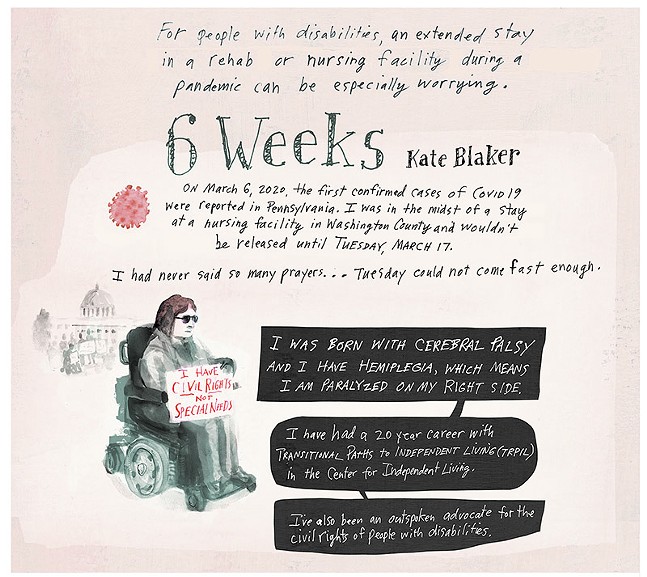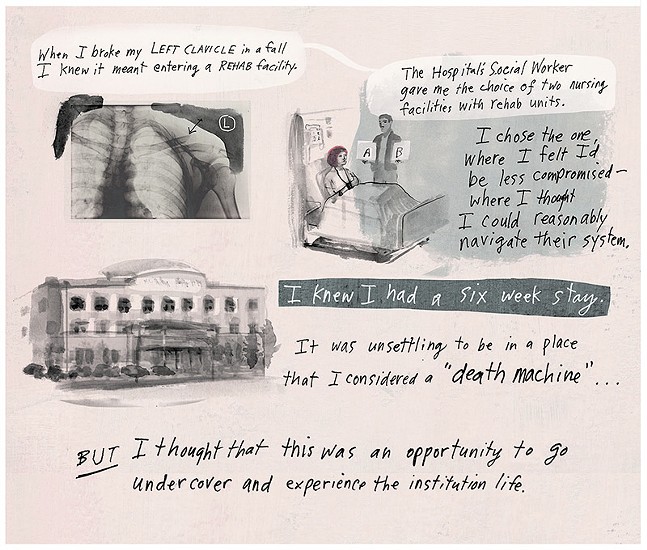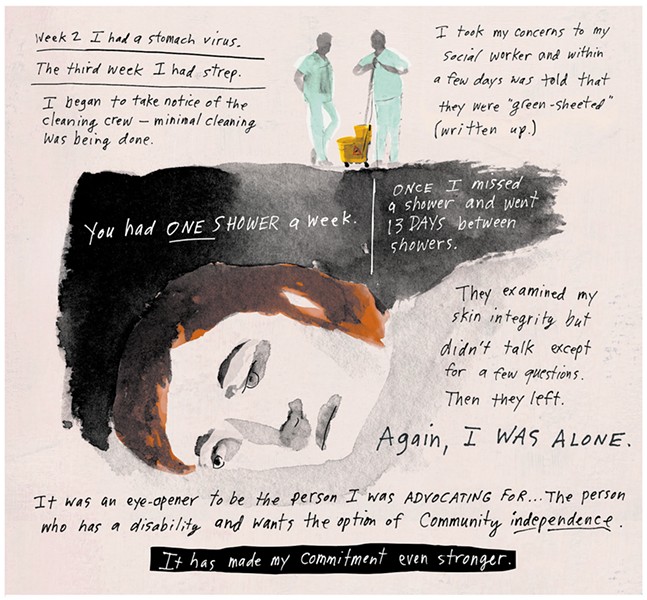 |
| This 2017 photo was filed as an exhibit in the criminal case against
Craig Young, a guardian with the now-defunct Ayudando Guardians Inc.
Prosecutors say the framed national guardian certification found by
federal investigators in his office was forged. (Source: U.S. District
Court) |
By Colleen Heild
As a court-appointed guardian entrusted to help New Mexico’s most
vulnerable people, Craig Young spent at least $1.4 million of client
funds, while drawing an $80,000 yearly salary and seldom reporting for
work.
Even his national guardianship certificate was a forgery, federal prosecutors say.
On Thursday, U.S. District Judge Martha Vázquez dismissed his plea
for home confinement as punishment and sentenced him to federal prison
for the next six years.
“The harm is unspeakable, Mr. Young,”
Vázquez said of the near 1,000 victims who lost a total of $11 million
in the multi-year embezzlement that involved his mother, Susan Harris,
his stepfather and a family friend – all employees of the nonprofit firm
based in Albuquerque.
Susan Harris, 73, was founder and president of the now-defunct Ayudando Guardians Inc.
As
the boss’s son, Young regularly used the company credit card for
personal expenses, but claimed he didn’t know that client trust funds
and savings were paying for his luxurious lifestyle that included a home
in Tanoan, seats at the Final Four basketball tournament and casino
gambling.
Young, 54, pleaded guilty last November to two
conspiracy charges in the high-profile federal prosecution that helped
spur state lawmakers to reform the state’s guardianship system in recent
years.
During a four-hour hearing streamed online on Thursday,
Vázquez lamented the “extraordinarily vulnerable victims” who lost their
financial lifelines in the scheme that dated back to at least 2010.
Some
clients, deemed incapacitated by the courts, had physical limitations,
others had mental difficulties handling their finances and all relied on
Ayudando, which the judge noted was Spanish for “helping.” Others who
weren’t wards of the state opted to put their savings and trust funds in
the company’s hands for safekeeping.
“You were their link,” the judge said. “You failed to protect. You failed them.”
At issue during Thursday’s hearing was whether Young knew the funds he was receiving came from client accounts.
Ryan
Villa, Young’s attorney, asked for 12 months of home confinement, with
three years’ supervised release. Prosecutors recommended 15 years in
prison.
Villa told the judge that, for a “very long time,” Susan
Harris and family friend, Ayudando chief financial officer Sharon Moore,
“were able to fool the entire world and the New Mexico community of
lots of very, very smart attorneys, judges and clients” that their
financial operations were legitimate.
Young was among those “tricked,” his attorney said.
“All
he knows is he’s getting money … and obviously it’s too much money to
be lawful, but that doesn’t mean he knows it’s stolen from clients,”
Villa told the judge. “He didn’t know, he didn’t inquire, he didn’t do
what he should have done as a fiduciary.” Young was also on the
nonprofit’s board of directors.
Young told the judge before
sentencing that he was sorry and hoped to repay some of what was stolen
from clients if he could continue working in the community.
“I’ve
always tried to be a nice guy,” said Young, who admitted to having a
gambling addiction. “I feel horrible, I really do. I didn’t even really
call them my clients. They were my friends. I loved those guys.”
Prosecutors
contended Young lived a carefree existence courtesy of Ayudando, one of
the most prominent providers of social services in New Mexico. “He
could work without so many of the burdens that weigh upon most social
workers,” stated the U.S. Attorney’s Office in a sentencing
recommendation.
With a yearly salary more than twice that of other Ayudando’s
guardians, Young didn’t have to worry about how to pay for his mortgage
on his home in Tanoan, his new Jeep, his recreational vehicle, his
vacations or his meals, the recommendation stated.
“As he knew
well, Ayudando money paid it all and all the money came from the
extraction of millions of dollars from hundreds of disadvantaged and
disabled people,” stated the prosecutors’ recommendation.
Young’s
mother was the “ringleader” of a “deeply corrupt scheme” inside what
appeared to be a family-owned charity operation, prosecutors have said.
His
mother “surrounded herself with a core group of people” that included
Moore, Young and her husband, William Harris, that “she could trust with
a terrible secret.” Each lived for years on client money.
Harris
and her husband, who entered guilty pleas last year in the embezzlement
conspiracy, fled New Mexico before they could be sentenced in the case
March 2. They were captured in mid-April in Oklahoma and returned to New
Mexico. Neither has been sentenced.
Moore, who is serving a
20-year sentence, “cooked the books,” Villa said. She is accused of
covering up the fraud and forging documents submitted to auditors.
“Virtually
every client to walk through the door into Ayudando’s offices lost
their money to the defendants’ greed,” stated the prosecutors’
sentencing recommendation.
Vázquez told Young that though the
legal issues in the case “were difficult, the fact remains that you were
not living within your means. You were using your company credit card
as a slush fund.”
Villa said the government had no evidence that Young was involved in any of the transfers of client money for personal use.
Prosecutors
argued that Young’s employment as a guardian provided a pretext for him
to obtain a huge stream of benefits from the company.
They noted
his lapsed certification by the National Guardianship Association. When
federal investigators searched his Ayudando office, they found he had
prominently displayed a forged guardianship certificate showing his
certification was current until 2018. It expired in 2011.
“He
wasn’t an asset to the business: he carried only half a caseload and his
clients complained about him constantly. He never answered his work
phone, so his voicemail was full. He never checked his email; his
desktop computer didn’t even have a mouse attached to it,” the U.S.
Attorney’s Office stated in its recommendation.
“Co-workers
reported that he was rarely at work,” stated the U.S. Attorney’s Office,
“and it was widely believed he was usually at casinos.”
Assistant
U.S. Attorney Jeremy Pena told the judge Thursday that even after
Young’s mother and Moore were initially arrested in July 2017, and the
scheme exposed, Young misled federal investigators and quickly sold a
$90,000 recreational vehicle purchased with client funds.
Instead
of returning those funds to victims, Young lived on the $37,000 proceeds
from that sale, and continued living in his home in the gated Tanoan
community in Albuquerque for another year.
“He offered himself up
as a person to make life-and-death decisions for his clients,” Pena told
the judge. “That is the standard we have to hold him to at this
juncture.”
Full Article & Source:
Ayudando guardian sentenced to 6 years in federal prison






















